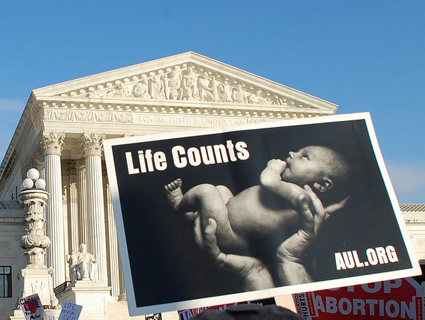Last Friday, as Nick Baumann and I completed our reporting on the anti-abortion group behind a nationwide push to broaden justifiable homicide laws to cover killings in the defense of fetuses, I contacted the organization, Americans United for Life, to request an interview. Specifically, I asked to speak with Denise Burke, AUL’s vice president for legal affairs and the author of the model legislation, the Pregnant Woman’s Protection Act, that the group has pressed state lawmakers to introduce. An AUL spokeswoman told me that Burke was travelling, and asked me to submit my questions in writing. So I did. AUL never responded. Instead, the group waited until after the story was published to blast Mother Jones on its website for “dishonest” and “intentionally distorted” reporting, complaining that the “anti-life media once again got their facts wrong.”
As we reported, AUL-inspired legislation has recently sparked controversy in South Dakota, Nebraska, and Iowa, with critics claiming that the measures are so expansive that they could potentially invite—if not legalize—the killing of abortion doctors. We write:
That these measures have emerged simultaneously in a handful of states is no coincidence. It’s part of a campaign orchestrated by a Washington-based anti-abortion group, which has lobbied state lawmakers to introduce legislation that it calls the “Pregnant Woman’s Protection Act” [PDF]. Over the past two years, the group, Americans United for Life, has succeeded in passing versions of this bill in Missouri and Oklahoma. But there’s a big difference between those bills and the measures floated recently in South Dakota, Nebraska, and Iowa.
While the Oklahoma and Missouri laws specifically cover pregnant women, the latest measures are far more sweeping and would apply to third parties. The bills are so loosely worded, abortion-rights advocates say, that a pregnant woman could seek out an abortion and a boyfriend, husband—or, in some cases, just about anyone—could be justified in using deadly force to stop it.
It’s not just anti-abortion groups that think these bills are bad news. Omaha’s deputy chief of police recently testified that Nebraska’s LB 232 “could be used to incite violence against abortion providers.” And a spokesman for South Dakota’s Republican governor—a staunch abortion foe—called the version of the bill introduced in that state “a very bad idea.”
AUL claims that its “groundbreaking model legislation seeks to ensure that a pregnant woman and her unborn child are protected from criminal violence and that her decision to carry her child to term is respected.” The group says the “the language explicitly limits the permitted use of force to a pregnant woman and does not expand it to third parties. Thus, under the express terms of AUL’s carefully crafted and narrow language, the ‘Pregnant Woman’s Protection Act’ could not be used to justify criminal violence against abortion providers or anyone else.”
It’s true that AUL’s model legislation is confined to pregnant women (though we never say otherwise). But the bills that this legislation has inspired—and which AUL has backed and in some cases testified in support of—are not, and AUL’s statement conspicously sidesteps this point. Further, according to Nebraska state senator Mark Christensen, who introduced LB 232, AUL both approached him with the idea for the measure and “helped draft the language.” His bill would have made it permissible for any third party to use deadly force as long as “the actor believes that his or her intervention is necessary for the protection of such other person.” (Following criticism from fellow lawmakers and others that the bill, as written, could cause unintended abortion provider violence, Christensen has agreed narrow the language of his legislation.)
Nevertheless, Denise Burke, who’s quoted in AUL’s statement, claims Mother Jones and the Huffington Post (which linked to our story) “intentionally distorted their reporting…in an attempt to further their own political agendas.” She adds, “Their actions are not only dishonest, but they do a grave disservice to the hundreds of thousands of pregnant woman who are assaulted or killed every year in this country.”
AUL’s statement is full of potshots at Mother Jones, but if fails to identify a single factual error with our story. It also neglects to mention that AUL requested and was provided with a detailed request for comment, which it then chose to ignore. If AUL wants to make the case that it is not behind a campaign to expand justifiable homicide statutes, which has manifested in bills that a range of critics believe could foment violence, then it should answer the questions we posed last week. Here they are once more:
– Bills based on AUL’s model legislation have already passed in Missouri and Oklahoma, but both laws limit the use of the justifiable homicide defense to the pregnant woman herself. Lately, we’ve seen AUL-inspired legislation in South Dakota, Nebraska, and Iowa that broadens the deadly force exceptions further and goes beyond the scope of AUL’s model legislation. Why is it necessary to expand deadly force statutes beyond the pregnant woman herself to cover third parties?
– What other state legislatures are either considering versions of AUL’s Pregnant Woman’s Protection Act or is AUL working with to craft such legislation?
– Omaha’s deputy chief of police has said the Nebraska version of the bill, introduced by Mark Christensen, could be “used to incite violence against abortion providers.” In light of this, has AUL rethought its support for this bill or the others that share similar language? If not, please explain why you disagree with critics who believe the Nebraska, South Dakota, or Iowa bills could lead to violence against abortion providers.
– Lawmakers who have introduced AUL-inspired bills have cited the Jaclyn Kurr case in Michigan as their motivation for introducing this legislation. Beyond the Kurr case, are there any other episodes you can cite where something similar has occurred?














